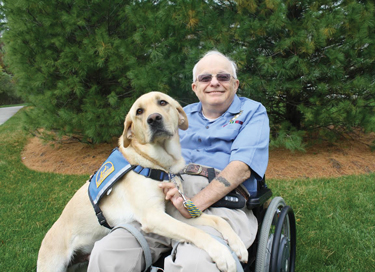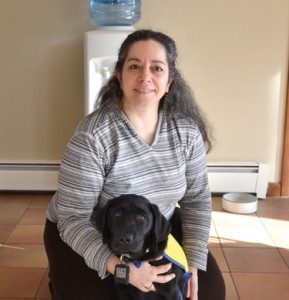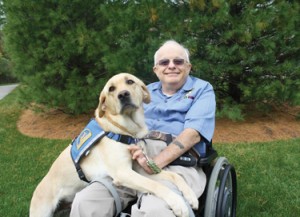

Ann Needle
by Ann Needle
Stow’s Leslie Zelamsky knows why parting can be such sweet sorrow. Training and raising assistance dogs for Canine Companions for Independence, Leslie has prepared six puppies to guide people with physical and emotional issues through productive lives.
Zelamsky, who is also an artist, recalled becoming an assistance dog trainer almost 20 years ago, when she sought out a career that would combine her love of dogs with helping others. She selected the non-profit Canine Companions because, “My sense was they care for both the dogs and people [the dogs] care for.”
Much of this inkling comes from the fact that the organization maintains ownership of the dogs for their lifetimes, Zelamsky said. Puppies are carefully chosen by CC experts before going to individual trainers across the country, then to advanced training when they are about 18 months old. At this point, the dogs are brought back to CC’s nearest regional training headquarters (Medford).
At about 2 years old, fellow and former puppy trainers gather for the “graduation” ceremony at CC’s Northeast headquarters on Long Island. After eight years of service, the dogs retire to homes selected by CC. As the owner of the dogs, the organization tracks them for the rest of their lives, Zelamsky said.
During the graduation of Zelamsky’s first dog, she was visibly upset to be sending off her young charge. She recalled being approached by a seasoned trainer at the ceremony. This trainer pointed to a photo of an assistance dog with the woman’s disabled granddaughter, remarking, “This is why we do this.”
Since then, Zelamsky has learned that everyone connected to CC is “like a big family.” Though CC clients receive their service companions for free, trainers are responsible for their own expenses, which she estimated can run up to $3,000 annually. She stressed that the “family” extends well beyond CC and its trainers.
Now training her seventh assistance dog, Bryn, pet store “Especially for Pets” pays for all of Bryn’s dog food and supplies, while Framingham Animal Hospital sponsors the puppy’s veterinarian care, Zelamsky noted. Zelamsky is an obedience manager at Especially for Pets’s Sudbury location, where she teaches a CC advanced training class that the graduate dogs are required to take each month.
Adventures in Puppy-dom
Back home, puppy training encompasses the routine rules of living in harmony with humans — and, often, the extraordinary. Zelamsky reported the puppies must learn a total of about 60 commands; one of these is being able to pick items off the floor as small as a dime.
These dogs also can perform many tasks often taken for granted by the able bodied, including turning light switches on and off, and opening and closing refrigerator doors. Trainers must bring the puppies — clothed in their bright yellow CC capes— into public as much as possible, to assure they can behave around all types of people and situations, she said.
Zelamsky proudly spoke of the successes of her former charges. One of her pups went to a physically challenged boy, enabling him to attend school more easily. The boy is now in college. Another trainee was given to a very active, adaptive skier and cyclist, who became the first person to drive up Mount Washington in a wheelchair adapted to a bike.
The latest of Zelamsky’s graduates, Jason, now resides in New York City with a wheelchair-bound Marine and Vietnam veteran who also deals with PTSD (post-traumatic stress disorder). When promoted, Jason and other assistance dogs living with PTSD clients can perform special tasks

Courtesy of Canine Companions for Independence
such as sweeping an unfamiliar room for explosives the client’s PTSD is telling them must be be there, she said.
Though this task may seem surreal to some, Zelamsky stressed that assistance dogs have proven to have a special sense of how to care for their humans.
She told the story of a man whose wheelchair flipped over and left him on the street; his assistance dog ran back into the movie theater he and his wife were attending, and brought the wife to her husband.
Assistance dogs face their own obstacles. Recently, some people have attempted to sneak their regular dogs into places where only assistance dogs are allowed, by dressing them in the capes assistance dog organizations require their trainees to wear.
When and if a business discovers its has been duped by these unauthorized dog owners, Zelamsky explained that the business often will make it tough for true assistance dogs and owners to enter. She remarked, “It’s a very poor use of a privilege some people need to have.”
Still, it seems Zelamsky’s dogs do travel just about anywhere. Jason flew with passengers to California twice to visit a woman Zelamsky said she became good friends with after one of Zelamsky’s dogs was assigned to her. Zelamsky said the dog still joyfully greets her.
“I absolutely miss my dogs when they leave,” Zelamsky agreed. “But I know there’s a greater purpose to what I do.”
For more information on Canine Companions for Independence, visit www.cci.org